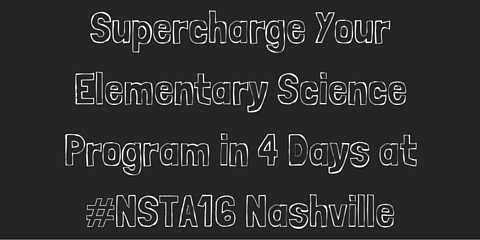Supercharge Your Elementary Science Program in 4 Days at #NSTA16 Nashville
By Korei Martin
Posted on 2016-03-11
Elementary science teachers will find an impressive array of Elementary programming at NSTA’s National Conference on Science Education, taking place in Nashville, March 31–April 3! Dive in on day one and learn more about engineering in the elementary classroom with Christine Cunningham’s Mary C. McCurdy Lecture: Integrate to Innovate: How Classroom Engineering Develops “Habits of Mind” That Empower Student Performance. Feeling even more adventurous? Put your cape, cowl, or utility belt on and become superhero in the Science and Superheroes: Integrating Science and Literacy Learning with Active Role Play and Comic Books session, which combines science and literacy for a fun time of learning for students. Check out the events below to get a sense of what we’ve got in store, and browse all the sessions here (more than 1000 of them!) to see what you can do in the elementary science classroom.
Teaching to Learn: An Elementary/Postsecondary Collaboration to Improve K–16 Science Teaching and Learning
- Explore a toolkit developed to engage liberal arts undergraduates in K–7 science co-teaching, improving science outcomes for K–7 teachers and students, college undergraduates, and faculty.
The Living Classroom: Turning Your Curriculum into an Outdoor Adventure Through Learning Gardens
- What we can teach in the elementary classroom can be more meaningful when seen in the context of an outdoor environment. Discover how to turn your current curriculum into learning opportunities in an outdoor laboratory.
Mary C. McCurdy Lecture: Integrate to Innovate: How Classroom Engineering Develops “Habits of Mind” That Empower Student Performance
- State and national science standards increasingly emphasize engineering concepts and skills as part of K–12 STEM instruction. But how do you fit engineering into an already crowded school day? And what engineering activities are right for elementary students? Christine will share a striking collection of candid short videos shot in classrooms around the country to show what engineering looks like at the elementary level, and how classroom engineering develops positive “habits of mind” that can support young students’ academic success in other subjects. You’ll also learn some concise pedagogical strategies to support robust engineering experiences for children, and hear the evidence for classroom engineering as a way to support science learning.
Using Creative Nonfiction to Integrate Writing and Science into the Elementary Classroom
- Lead students in researching and writing a creative nonfiction story using a science trade book as a launching point. Lesson plan, model, and materials provided.
Science and Superheroes: Integrating Science and Literacy Learning with Active Role Play and Comic Books
- Experience how first-graders learned the science behind a series of gadgets they used to defeat villains in game play, and how fifth-graders role-played as news reporters in these game play scenes to gather ideas for writing their own comic books. Capes optional.
Elementary Extravaganza
- This Extravaganza is not to be missed! Join elementary groups of professionals for an exceptional opportunity. Gather resources for use in your classroom immediately. Engaging hands-on activities, strategies to excite and encourage your students, a preview of the best trade books available, information about award opportunities, contacts with elementary science organizations, sharing with colleagues, door prizes, and much more will be available to participants. Walk away with a head full of ideas and arms filled with materials.
Organizations participating in the Elementary Extravaganza include:
- Association of Presidential Awardees in Science Teaching
- Council for Elementary Science International
- NSTA Preschool Elementary Committee
- Science & Children authors and reviewers
- Society of Elementary Presidential Awardees
Elementary Teacher Survival Kit
- This hand-on workshop—chock full of easy-to-do science inquiry lessons—enables new and veteran teachers to expand their bag of tricks. Using discrepant events, these activities give students a sense of mystery and awe. Topics include energy, air pressure, scientific method, data collection, and graphing. Door prizes and giveaways!
Register to attend here—and don’t forget, NSTA members get a substantial discount!
The mission of NSTA is to promote excellence and innovation in science teaching and learning for all.
Future NSTA Conferences
2016 National Conference
2016 STEM Forum & Expo
2016 Area Conferences
Follow NSTA
Disclaimer: The views expressed in this blog post are those of the author(s) and do not necessarily reflect the official position of the National Science Teaching Association (NSTA).



